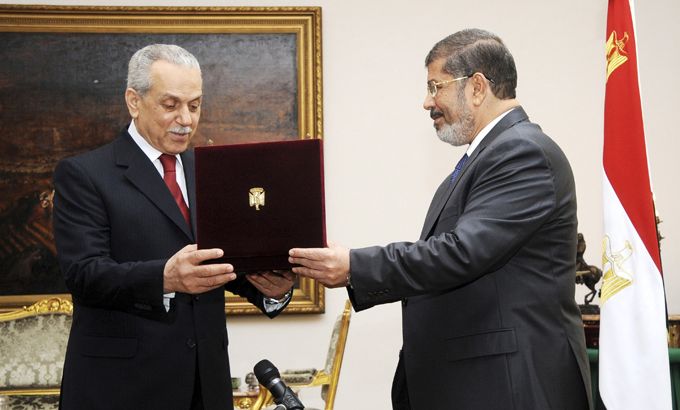Egypt’s top court rebukes president’s decree
Judges tell President Morsi he cannot reconvene parliament after they ordered it dissolved last month.

Egypt’s Supreme Constitutional Court has rebuked newly elected President Mohamed Morsi, meeting in a special session to assert that Morsi has no right to reconvene parliament after the court ordered it dissolved last month.
On Sunday, Morsi issued a decree reconvening the parliament in defiance of the court and the Supreme Council of the Armed Forces (SCAF), both of which wanted parliament dissolved.
Saad el-Katatni, the speaker of the erstwhile parliament, said lawmakers would convene at 10am on Tuesday in reponse to Morsi’s decree, two hours earlier than their usual meeting time. But it remained unclear which MPs would join.
 |
Katatni and Morsi are both members of the Muslim Brotherhood, which won nearly half of the parliament, and the ongoing political conflict between the military and Egypt’s elected officials is seen by many liberal and secular politicians as a battle to determine the Brotherhood’s post-revolution political powers.
“All the rulings and decisions of the Supreme Constitutional Court are final and not subject to appeal … and are binding for all state institutions,” the court said in a statement on Monday.
The military supported the court’s position in a statement of its own, saying it’s order to dissolve parliament in June “represented the implementation” of the court’s decision, which found the manner of the parliamentary election unconstitutional.
Yussuf Auf, a judge in the Giza governorate and constitutional scholar, said he believed Morsi had exceeded his power by reconvening parliament, and that this represented “a severe problem for the rule of law in Egypt”.
“I think it’s just a political conflict, it’s not a legal conflict … between the president and the military council, and the two parties are trying to find a legal basis for their decisions, just to support their point of view,” he said.
Analysts believe that the military council and state institutions still packed with old regime loyalists have attempted to constrain the Brotherhood in the months since their parliamentary gains.Two days before the presidential election began last month, the court ruled that the legislature’s election was unconstitutional since political parties were allowed to run for one-third of seats reserved for individuals.
Days after the court dissolved parliament, and just minutes after polls closed in the presidential election, the military issued a unilateral package of constitutional amendments stripping the president of his role as commander in chief, asserting autonomy over their budget and affairs, and assuming the power to legislate until a new parliament could be elected.
Though the constituent assembly tasked with drawing up Egypt’s new constitution is currently functioning, after being selected by the dissolved parliament, the SCAF also gave itself the power to choose a new assembly if the current one runs into any problems.
The amendments were seen as a pre-emptive attempt to limit Morsi’s powers, should he win.
For the past month, the Brotherhood has argued that the court’s decision was wrong and that the military, at the time the executive authority in the country, had no legal right to order parliament dissolved.
“The SCAF did not hand over power totally to the new president … and this is the point,” Auf said, adding that Egypt’s judiciary had suffered a “huge negative effect” from ruling on numerous political cases since the 2011 revolt.
“One way to solve the problem is to have the supplementary constitutional declaration amended and give the legislative powers to the [parliament] again,” he said. “If I have to choose between the legitimacy of the SCAF or the president, I have to choose the legitimacy of the president.”
In its Monday statement, the military said its constitutional declaration “came as a result of the political, legal and constitutional circumstances that the country was facing”.
It added that the declaration “ensures the continuity of state institutions and the [military council] until a news constitution is drafted”.
The military said it was “confident” that all state institutions will respect constitutional declarations.